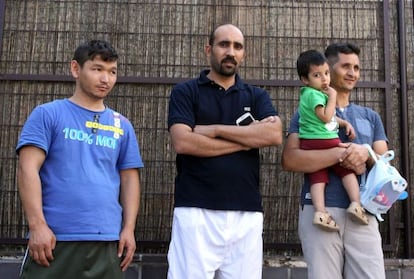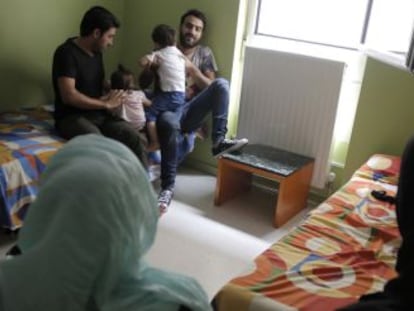Spain will take in more refugees but says it is overwhelmed by petitions
Brussels wants Madrid to accept around 15,000 claims, making it a top recipient nation


The Spanish government has confirmed that it will take in more refugees than the 2,749 it had originally planned to accept before this summer’s sudden surge in asylum seekers.
The European Union wants to assign Spain a quota of 15,000 refugees, representing 12.44 percent of the 120,000 people that Brussels wants to distribute among member states.
Spain would thus become one of the biggest recipients of refugees, along with Germany and France.
The Spanish executive says it is already overwhelmed by its own forecast of 17,000 asylum applications for 2015 – three times more than in 2014
A committee of ministers presided by Deputy Prime Minister Soraya Sáenz de Santamaría is due to meet today to discuss exactly how many people Spain is going to take in.
But the Spanish executive says it is already overwhelmed by its own forecast of 17,000 asylum applications for 2015 – three times more than in 2014.
Spain will now “make a greater effort, although for us the main difficulty lies in handling all the asylum applications, even though we have bolstered the personnel and resources at the office that deals with those claims,” said a government source involved in the effort.
In a little over a week, the Popular Party (PP) government has shifted its attitude on the migrant crisis. Following the first Cabinet meeting of the summer, Sáenz de Santamaría warned that there would be a limit on Spanish solidarity.
But the government became much more receptive after Prime Minister Mariano Rajoy met with German Chancellor Angela Merkel last week, then received a visit from British PM David Cameron on Friday. Adding to this was the impact of the widely publicized image of a Syrian child who drowned trying to reach Europe.
The new message was issued first by Rajoy and later by Interior Minister Jorge Fernández: Spain will not put any boundaries on its solidarity with the refugees.
But officials added that the executive wants to coordinate its response through “a state-wide policy” after several cities and regional governments took a leading role in the crisis, offering to help asylum seekers using their own resources.
Spain received 2,588 asylum claims in 2012, 4,513 in 2013 and 5,952 in 2014.
Whatever the final refugee figure, it will not affect the number of migrants fleeing poverty and political instability in Africa who are allowed into Spain, as the government is keeping both issues separate.

The government had earlier argued that Spain cannot accept large numbers of refugees because its resources are already overstretched by the thousands of undocumented migrants who cross into Ceuta and Melilla, two Spanish exclaves locate on the northern coast of Africa and that represent a southern gateway into Europe.
Rajoy is insisting on the need for a “global” European policy that does not just take into account the current refugee crisis but also the issue of illegal immigration. He has presented Brussels with a document setting out the Spanish vision for such a policy, which includes actions with the countries of origin to help solve the political and economic problems that create the migrant flows.
The Spanish leader offered up his country’s own experience working with African governments, including Morocco, where bilateral cooperation has helped stem the influx of migrant boats that once arrived on Spanish shores.
English version by Susana Urra.
Tougher on other migrants
The European Commission's new plan for refugee redistribution places the bulk of the burden on just a few countries. Germany, France and Spain will have to take in 59 percent of the 120,000 asylum seekers now stuck in Hungary, Greece and Italy.
In exchange, Brussels will get tougher on migrants without the right to asylum, and even issue arrest warrants against them if there is a risk that they will disobey their deportation orders.
Tu suscripción se está usando en otro dispositivo
¿Quieres añadir otro usuario a tu suscripción?
Si continúas leyendo en este dispositivo, no se podrá leer en el otro.
FlechaTu suscripción se está usando en otro dispositivo y solo puedes acceder a EL PAÍS desde un dispositivo a la vez.
Si quieres compartir tu cuenta, cambia tu suscripción a la modalidad Premium, así podrás añadir otro usuario. Cada uno accederá con su propia cuenta de email, lo que os permitirá personalizar vuestra experiencia en EL PAÍS.
En el caso de no saber quién está usando tu cuenta, te recomendamos cambiar tu contraseña aquí.
Si decides continuar compartiendo tu cuenta, este mensaje se mostrará en tu dispositivo y en el de la otra persona que está usando tu cuenta de forma indefinida, afectando a tu experiencia de lectura. Puedes consultar aquí los términos y condiciones de la suscripción digital.









































